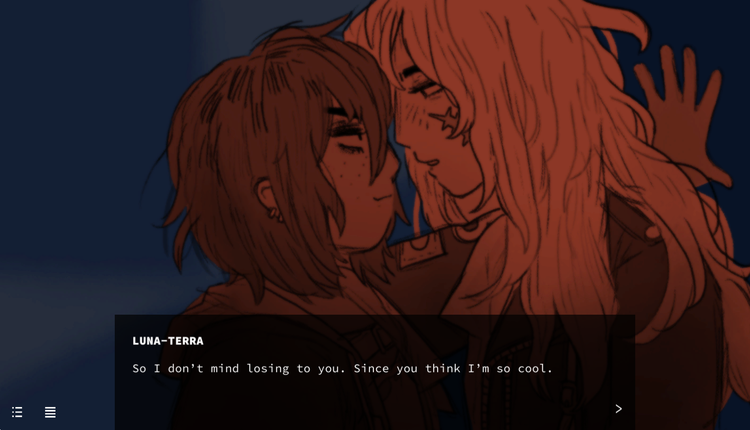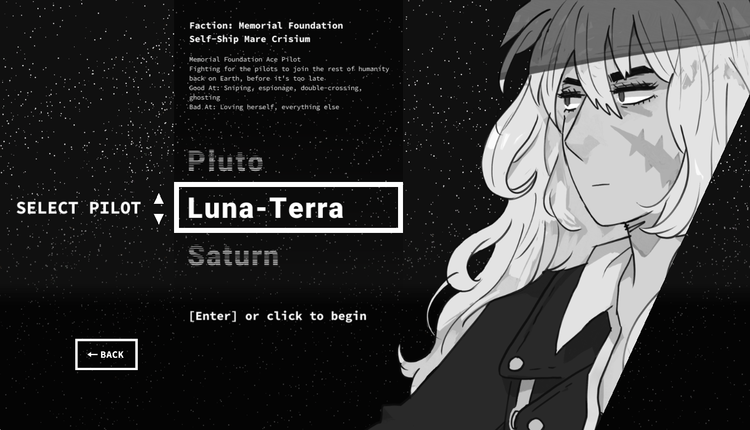Beauty and Betrayal far from Earth in Heaven Will Be Mine
Heaven Will Be Mine starts with a field of stars as its title screen. It’s soft and inviting, promising that age-old scent of adventure that comes with traversing the final frontier. Once you’ve picked a character’s story to follow though, the game screams. A blast of harsh electronica and scratchy sound effects as technical read-outs start filling the screen. It’s a sudden reminder that the freedom of space is burdened by what got us there. The sky comes at a cost. Trying to reach heaven inevitably creates some scars.
That’s the dichotomy behind the latest visual novel offering from Pillow Fight/Worst Girl Games, their follow-up to the 2015 release, We Know The Devil. While that visual novel dealt with the supernatural set in a tense, enclosed summer camp as teens confront the devil itself, Heaven Will Be Mine goes for something more expansive. It’s a visual novel telling of a queer mecha anime story, with all the trappings: giant robots shaped like humans, intense rivalries bordering on the flirtatious, fractious factional warfare and messy questions about the nature of humanity and space.
In an alternate 1980’s, Earth found itself at war with an Existential Threat that necessitated a revamp of its space program with the creation of Ship-Selves, essentially giant humanoid robots, to fight this menace. That war has since passed and those who went to space find themselves split between three groups: the Memorial Foundation who advocates a return to Earth, Cradles’ Grace who wish to build a new home out in the stars and Celestial Mechanics who are more interested in pushing the boundaries of what it means to be human.
Those three factions are represented by the three player characters, the ones who pilot the Ship-Selves; the world-weary ace pilot Luna-Terra, the graceful princess Pluto and the impish hacker Saturn. As is typical of a visual novel, you pick one at the start and go through their route, their story as it intersects with the other characters and more of the world is teased out. Still, this isn’t as static as the term ‘visual novel’ implies, with gorgeous art done by Mia Schwartz and a brooding, voluminous electronica soundtrack by Alec Lambert.
It’s a dense journey, as the only real source of input from the player will be clicking through dialogue, e-mails and correspondence, piecing together this haunted story and then making a binary choice to prod the story to one of three endings. “Visual novel” is exactly as it says, a genre of video games where the player experiences a novel with more sensory input such as music and art direction. It can’t really be called a game. There’s no win condition. Just a beginning, middle and end. Journey into a story, a world for a few hours.
And in the case of Heaven Will Be Mind, it’s a bleeding, haunted, broken world. While a small blurb describes each character in the select screen, there’s very little preparation given once players dive into the game. It’s like jumping to the final act of a long-running TV show. Characters talk about events and relationships in oblique, teasing ways. The world of Heaven Will Be Mine very much resembles the collision of humanity’s idealistic vision of space and the crushing, yawning void of reality. On one hand, girls in impossible machines battle each other over gravity wells and colonized planets far from Earth. On the other hand, those colonies have failed and the factions in space have been left to flail against each other, abandoned by their home planet.
[perfectpullquote align=”full” bordertop=”false” cite=”” link=”” color=”#70006C” class=”” size=”19"]“We could have made them look like anything but we made them look like us.”[/[/perfectpullquote]p>
This is a game that holds you at a remove. It’s such a tense world that any conversation is often a contest of wills where neither side wants to give in to the other. There’s a demand of the player to buy into the fiction of the world immediately. The characters talk around each other, always careful, always probing, never letting an inch of their person go without a fight. They talk about philosophy, duty, history, they talk about the consequences of sending people into space and what the decades have wrought upon them. They talk about Earth and how those at home don’t even consider those in space human anymore. They talk about regrets and failures and who’s been responsible for what.
Oh and they flirt a lot as well. There isn’t a single interaction between any of the three main characters that isn’t laced with playfulness and sexual tension. Turns out that repeatedly fighting against people who can hold their own against you, through the medium of giant robots, can be a huge turn-on. Mecha anime has long been replete with intense rivalries and relationships between pilots where the sweet, sticky scent of tension often goes unresolved. It’s a genre predicated on giant humanoid robots fighting each other, after all. The melodrama inherent is hard to escape from.
The difference is that while most mecha anime is content to leave that to subtext, Heaven Will Be Mine actually drags up the subtext straight into text, indulging in the fantasy of these amazingly flawed, amazingly skilled women testing their mettle against each other, with the chance that they’ll be making out with each other by the end of it. It plays with the visual absurdities of creating gigantic war machines in the form of humanoids, a choice that often renders the actual act of fighting glamorous and spectacular. As another queer mecha narrative asked, “We could have made them look like anything but we made them look like us.” Heaven Will Be Mine actually has an answer to that question and it’s an answer that very much plays with the coy, rival-friend-lover dynamic that every main character has with each other.

But this is more than just simple wish fulfillment. Much of the anxiety surrounding those left in space comes from the fact that, after decades of war and living out there, Earth doesn’t consider them fully human anymore. In fact, when the space program was first launched, those who chose to join were, in their own way, outsiders within Earth. Characters talk about the “gravity” of Earth holding them down and wanting to be free of it by soaring beyond the skies. But as it turned out, everyone had different ideas about what it meant to find their own gravity. Earth deemed them as the “other” so they escaped to the stars to become the “other” that they wanted to be.
And the text is pretty clear as to what kind of “other” the main characters thought themselves to be. Heaven Will Be Mine is upfront with being a queer rendering of mecha anime. It’s a cast of queer characters fighting for their own definition of humanity, fighting for their own gravity, fighting to not be weighed down by the gravity of others, no matter how hard the different factions try to push them around. They fought for the space to define themselves, out there in the stars, and they’ll continue to do so, no matter what the home planet thinks of them. The story of Heaven Will Be Mine is of these three women carving out their own tale from the world around them.

It’s definitely a story that can be hard to access. Heaven Will Be Mine, much like its characters, is guarded when it comes to telling its tale. Its forbidding aesthetic, terse atmosphere and shimmering soundtrack all paint a world that seems layered and dense. You need to carefully pick away at its defenses before you can see it’s cracked, glittering heart. But persevere through and one will find a plaintive cry for those who don’t fit in, those crushed by the demand of society to be something they’re not. It’s a visual novel that’s equal parts deadpan, philosophical, poetic and brimming with ideas, a cracked gem of what video games routinely tackle outside of the AAA machine. Heaven Will Be Mine asks what it means to be human in an inhuman space. But as the novel glibly puts it, “It’s just a metaphor anyway. You can be human anywhere.”

